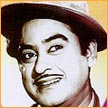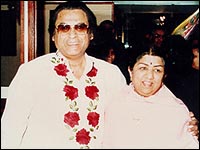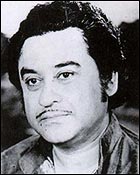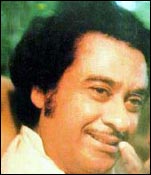
|
The human puzzle
Who was Kishore Kumar? Will any one ever know?
|
Dr Rajiv Vijayakar
You could solve the most abstruse mathematical riddle or scientific conundrum. You could unravel the Rubik's Cube or the mysteries of the universe. But you would be hard put to figure out a human puzzle called Kishore Kumar Ganguly.
Moody, crazy, eccentric, self-centred, disciplined, genius, rich, miserly, shrewd, simple, God, icon, all-rounder --- the adjectives could go on and on, but you couldn't even begin to figure out Kishore Kumar.
The late Ashok Kumar, Kishore's elder brother on whose birthday Kishore passed away October 13, 1987, would recall how Kishore as a teenager would perform in front of his guests at parties: 'He would demand payment for every song he sang, 25 paise for my song, 50 p for others and Re 1, a big sum in those days, for a Saigal song.'
Kishore Kumar never formally learnt music, but his riyaaz comprised listening endlessly to Kundan Lal Saigal, another natural genius, and yet Kishore never imitated him once he turned singer himself. Amar Haldipur, composer, musician and arranger for decades (Shahenshah, Dr Babasaheb Ambedkar) to men from S D Burman and Shanker-Jaikishan to Laxmikant Pyarelal, Rajesh Roshan and Anu Malik, worked extensively with Kishore as a singer.
Says Amar, "Kishoreda was a school of singing by himself. Since no one trained him, he created his own style. When singers like Rafi, Mukesh or Manna Dey sang, what came across was a song identifiable with the composer's style --- you could say that Yahoo was a Mohammed Rafi-Shanker-Jaikishan song, Madhuban mein a Rafi-Naushad song, and Yeh reshmi zulfein a Rafi-LP song.
"But Kishore's songs were primarily Kishore's songs rather than those of S D Burman, R D Burman or anyone else's. He had that strange gift for converting every song he sang to something that belonged more to him than its creator."
Amar remembers a quirky quality that Kishore had --- of always complaining to the composer that the song was too difficult for him to sing. He would keep blundering in the rehearsals and would keep complaining that he could not sing the song at all. The music director would keep coaxing him, telling him to change small things that he was not getting right.
Finally, fed up, the composer would tell him to try a take. Once at the mike, Kishore would sing to perfection, with the finest details and points miraculously included.
"No one ever knew the real Kishore," says Amar. "He was a character even more mysterious than any that the Ramsays could possibly invent!" But the veteran believes that for all this, Kishore was an isolated man who
was also somewhat self-centred. "Towards the end of his career, he was very unhappy with the kind of songs that he was getting, as music was on a decline," recalls Amar.
"So he invented this kid who would talk with him in a small boy's voice and call him Daddy," continues Amar. "When he got a song that he did not like, he would --- in front of the music director --- say, 'What a bad song, daddy!' in that child's voice. Then Kishore would embark on a conversation where he would chide the child about his manners and remind him that it was his duty to sing the song, as 'Uncle' (the music director or producer) was paying him good money.
"And the 'child' would say, 'Par Daddy, yeh cross-line kitni gandi ha! Yeh gaana mat gaao, chalo ghar chalte hai [But Daddy, the cross-line of this song is bad. Don't sing this song. Let's go home] .' And the whole thing would go on, much to the delight of onlookers and to the embarassment of the poor music director!"
 Constant laughter and fun in the studios and at shows was a Kishore trait that everyone who was associated with the man remembers. "We would laugh so much that our voices would be strained!" says Kavita
Krishnamurthy, who sang duets with him in films like Karma, Mr India and others, and performed at dozens of shows. "He would then go on stage and sing a sad song so well that it would bring tears to everyone's eyes, and come backstage and start his pranks all over again!"
Constant laughter and fun in the studios and at shows was a Kishore trait that everyone who was associated with the man remembers. "We would laugh so much that our voices would be strained!" says Kavita
Krishnamurthy, who sang duets with him in films like Karma, Mr India and others, and performed at dozens of shows. "He would then go on stage and sing a sad song so well that it would bring tears to everyone's eyes, and come backstage and start his pranks all over again!"
Adds Alka Yagnik, "Every one in my family has always been a crazy fan of his. All our great singers were great, but if you look into the tapes and CDs that lie in my car and house, you will see an overwhelming majority of just two names, Lata Mangeshkar and Kishore Kumar. And it was my great luck that I got to record, in those days when recordings were live, over 15 duets with him, besides doing shows."
Alka points out that she was a mere child when she learnt something invaluable from Kishore Kumar. "Kishoreda had thrown a party at his own house, Gauri Kunj, to celebrate the first ever award that Amit Kumar won as playback singer. All of us in Kalyanji-Anandji's troupe had accompanied Kalyanjibhai and Anandjibhai to the party.
"At ten sharp, Kishoreda told everyone that he had an early morning recording the next day and that he was going off to sleep, though we could keep the party going as long as we all wanted. Within that fun person lay a disciplinarian who took work very seriously. The impression this made on me even as a child ensures that I too follow this even now! Sleep is vital for a singer's tonal quality at the mike."
Alka had a taste of his kinky humour too. "It was understood that if he was around, everyone would be in splits, often at someone's expense. For an Anu Maliik recording for Mera Haque, he would wink at me and keep troubling a young and anxious Anu by singing Aaj hum mile hain Iftekhar (the veteran character artiste who specialised in cop roles) se," instead of Aaj mile hain ittefaq se.
"And poor Anu kept telling him, 'Uncle, it is ittefaq, not Iftekhar." Kishoreda would promise to sing correctly and the whole thing went on as long as the rehearsals.' It would be superfluous to add, of course, that the take was perfect, and Anu was much relieved.
Anu Maliik smiles at the recollection today. "He was God. Not only did he sing almost a 100 songs for me, he also sang I am John D'Mello, ding-dong wala with me in Taaqatwar. What he was is evident from the fact that till today all singers who try and sing his songs fall flat.
"I have two special memories of Kishoreda. One, that I was the only young music director to be invited to his home alone for a meal. And of Manji (Manmohan Desai) accepting my request to call Kishoreda to sing for Amitabh Bachchan in Gungaa Jamunaa Saraswati and Toofan even though they had some problem between them for many years."
But the composer who recorded more with Kishore than any other music maker of the younger generation was Bappi Lahiri. And the one-time pop icon raves about the man who was also his mama (maternal uncle). "Kishoremama was a legend!" crows Lahiri, who gave a gamut of songs ranging from te sublime Manzilein apni jagah (Sharabi) to the crass Jhopde mein charpai (Mawaali).
 "He sang in 1971 in my first film Daadu in Bengali, my Hindi debut, Nanha Shikari in 1972 and as it happened, he recorded his last song, Guru guru ho jaa shuru for my Waqt Ki Awaaz, just a day before he passed away. In addition, he sang so many Bengali film and non-film songs for me."
"He sang in 1971 in my first film Daadu in Bengali, my Hindi debut, Nanha Shikari in 1972 and as it happened, he recorded his last song, Guru guru ho jaa shuru for my Waqt Ki Awaaz, just a day before he passed away. In addition, he sang so many Bengali film and non-film songs for me."
Film lyricists, composers and singers each have to be all-rounders to sustain, and Kishore Kumar incredibly, was also all three. Says veteran Pyarelal, "I fully subscribe to R D Burman's statement that Kishore excelled in every kind of song, role and activity. You could find every shade and colour of creativity in him as comic, romantic and tragic actor, singer, composer, writer, lyricist, producer, director, even editor. I must mention that Kishoreda always exhibited only his serious side in his personal interactions with me. We would spend hours discussing music, especially Western music of which we were both so fond.
"He was a great fan of Danny Kaye, Frank Sinatra, Pat Boone and Nat King Cole. But just as he never copied Saigalsaab, he never imitated them but put in elements from their singing into his songs. He was different from the rest and way ahead of his time, which is why his songs appeal even to today's tots. My three-year-old grandson began to dance in front of the television while watching him sing and enact Bindu re bindu from Padosan. Pancham [R D Burman] could share credit with Kishore for the composition and singing, but it was Kishore's acting also that scored. After all for today's generation, music is to be seen rather than just heard as it was in the olden days."
Pyarelal affectionately remembers Kishore's moods. "Just because he was a musician and had a comic image, he decided to make the songless and sad film Door Wadiyon Mein Kahin, and at one time he told me that he would like us to score the background music. But then he changed his mind. Because it was a Kishore Kumar film, he decided that it would not even have background music! I remember Laxmi [Laxmikant] and I going to his house for a rehearsal and finding a completely renovated living room. But one pillar was left ugly and unpainted. While leaving Laxmi asked him why he had left that small part undone.
"Kishoreda looked at him and said, 'That's why. So that people ask me this very question!'
"Kishore Kumar left behind a whole school of singers. If son Amit Kumar inherited his style but consciously tried to be different, there are a whole lot of singers who could be said to have subscribed to the Kishore Kumar school and made their fortune by emulating or imitating him --- among them Kumar Sanu, Abhijeet, early Sudesh Bhosle, Babul Supriyo, even Shaan."
Says Abhijeet, "Kishore Kumar was my greatest source of inspiration. His style has generated a whole gharana of singers, just as we have the various gharanas in classical music. He was in that sense like my guru. His throw and his expression were unique and all his own. His range was phenomenal --- he could take his voice as high as any trained singer, but only he could go very low and still remain effective. No one, I think, ever made Kishore sing. What Kishore always sang was his interpretation of the music director's tune! There was something natural in his singing, and his playback voice at once conferred dignity on even a B-grade or sadak-chhap actor."
 Kumar Sanu, the man who cloned Kishore all the way from his struggling days as a singer in seedy night clubs and Kishore Kumar cover versions for T-Series to being R D Burman's first choice as a Kishore replacement
in 1942 -- A Love Story, says, "Yes, Kishoreda was my inspiration. But so were [Mohammed] Rafisaab and Mukeshji. I studied and absorbed everyone's good points. But because my voice resembled Kishoreda's, I got to sing his songs in cover versions, and was called a Kishore Kumar clone."
Kumar Sanu, the man who cloned Kishore all the way from his struggling days as a singer in seedy night clubs and Kishore Kumar cover versions for T-Series to being R D Burman's first choice as a Kishore replacement
in 1942 -- A Love Story, says, "Yes, Kishoreda was my inspiration. But so were [Mohammed] Rafisaab and Mukeshji. I studied and absorbed everyone's good points. But because my voice resembled Kishoreda's, I got to sing his songs in cover versions, and was called a Kishore Kumar clone."
Composer Anandji has the last word on the mystery man. In an interview with rediff.com a month ago, the maestro had said, 'Being an actor, he would ensure that he 'mimicked' the actor's style in the song he sang for a star. Contrary to what many thought, he was a spiritual man. He would call us Maharaj and was so sentimental that once when we were performing with his son Amit Kumar in London he came there all the way to wish him on his birthday!
"But he sat in the car and never entered the auditorium, saying that if he did we would make him sing on
stage and not pay him!"
The real Kishore Kumar may be hidden in all that you have just read. But then again he may not. After all, Kishore Kumar was a rabid fan of Alfred Hitchcock.
You Might Also Want To Read:
My Baba, Kishore Kumar